| Reviews & Columns |
|
Reviews DVD TV on DVD Blu-ray 4K UHD International DVDs In Theaters Reviews by Studio Video Games Features Collector Series DVDs Easter Egg Database Interviews DVD Talk Radio Feature Articles Columns Anime Talk DVD Savant Horror DVDs The M.O.D. Squad Art House HD Talk Silent DVD
|
DVD Talk Forum |
|
|
| Resources |
|
DVD Price Search Customer Service #'s RCE Info Links |
|
Columns
|
|
|
West Wing - The Complete Series Collection, The
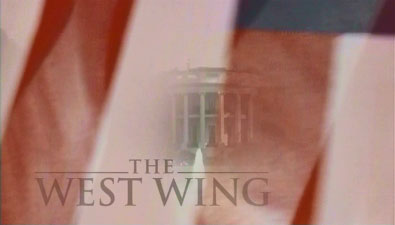
INTRODUCTION:
The United States government is run by highly intelligent and fiercely devoted servants of the public good, and its presidency is occupied by noble, brilliant, and charismatic men whose insightful leadership inspires the world. This is the romantic fantasy created by writer Aaron Sorkin, alongside directorial partner-in-excellence Thomas Schlamme, and it is the base idealism that fueled seven seasons of one of television's greatest achievements. Throughout its impressive run, The West Wing took viewers behind the scenes of numerous aspects of American government, focusing heavily on the unsung individuals who staff its Executive Branch and the controlled insanity they face every single day. It turned seemingly mundane political maneuvering into compelling drama, and its steadfast optimism toward our human capacity brought hope to even the most jaded and frustrated viewers. Now the entire journey is available on DVD from Warner Bros. Entertainment in a stylish box set, complete with the pilot script, a gorgeous 70-page episode guide, and all 154 episodes spread across a staggering 45 discs.
N.B.: While I have made efforts not to reveal any more than necessary, this review covers seven seasons of a television show and would be impossible to write without discussing certain key plot points along the way.
CONTENT:
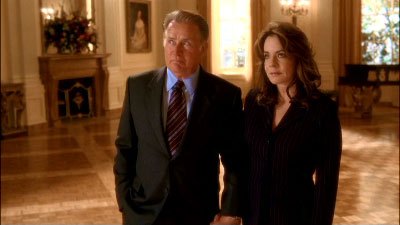
The West Wing is so many different things that it is difficult to know where to begin. As originally envisioned, the series was to focus almost exclusively on the senior staff members of the White House, how they supported the President's agenda by developing policy and crafting his message for presentation to the American public. The President himself would appear from time to time when necessary, but the thrust of the show would be the men and women behind the man. All that changed, however, when Martin Sheen joined the cast, storming into the pilot's final act with a commanding presence that could not be ignored. Sheen's contract was retooled, the concept was revised, and what emerged was not just a window into the offices of senior staffers but a detailed analysis of all aspects of the Executive Branch.
Sheen stars as President Josiah "Jed" Bartlet, a former three-term U.S. Representative and two-term Governor from the state of New Hampshire. Although a direct descendant of one of the state's first governors, Bartlet was never groomed for public office, instead focusing his studies on theology and economics, nearly becoming a priest but ultimately earning his doctorate and a Nobel Prize for the latter. His brilliant mind and deep understanding of world history, combined with a charismatic presence and strong personal integrity, make him an attractive candidate for elected office, but it is the political savvy and military experience of his close friend Leo McGarry (John Spencer) that elevates him to the highest office in the land.
McGarry is the more traditional Washington personality. Both a lawyer and veteran of the Vietnam War, he once ran a major defense company and has worked in multiple areas of national government, including most prominently as Secretary of Labor for the previous administration. Inspired by what he feels Bartlet can do for the country, Leo is the one who convinces Jed to run for the nomination, using his vast political and business connections to assemble a team of top thinkers and campaign experts who will ultimately take his friend to the White House. Once elected, McGarry serves as Bartlet's Chief of Staff, the right-hand man to the President who oversees the managerial day-to-day operations of his senior advisers so the elected leader has time to focus on the larger issues of the day.
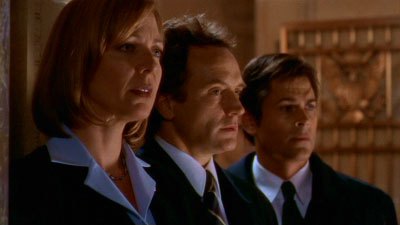
While there are many senior staffers assisting the President at the White House, The West Wing focuses most heavily on communications and policy. Directly assisting Leo McGarry as Deputy Chief of Staff (for Strategic Planning) is Josh Lyman (Bradley Whitford), a brilliant individual who is acknowledged by most to be one of the top political minds in the nation. His duties entail pretty much whatever Leo tells him to do, but most of his time is concentrated on gathering support for the President's agenda, often meeting with congressional leaders and powerful special interest groups. Josh's political expertise also plays a prominent role when strategizing for elections, be it Bartlet himself or other key members of the party. Although it would not be accurate to characterize him as an "everyman", his passion and enthusiasm are the most identifiable for the audience, and as the series progresses through the years, The West Wing becomes as much about Josh Lyman than anyone else on the show.
-- Leo McGarry
Crafting the President's message for the American public is the communications staff, run by its Communications Director Toby Ziegler (Richard Schiff). Toby serves the President in many capacities, chiefly as his top speechwriter but also assisting in the development of policy. He is a gruff and often morose man from the Bronx who did not enjoy the same educational privileges of his peers, attending public schools and city college, and at times he seems to carry a chip on his shoulder about it. Like many writers, he is very self-contained, agonizing over every word and constantly unsatisfied with the results, a feeling that is sometimes exacerbated by his disagreements with the President on policy. While most of the staff are typically in agreement with Bartlet on the issues (or simply do not have a strong opinion one way or the other), Toby is incredibly passionate and opinionated about nearly everything, and this often puts him in the position of being critical of the President's decisions. Fortunately for him, Bartlet values the intelligent disagreement and often sees Toby as the conscience of his administration.
Serving under Ziegler as the Deputy Communications Director is Sam Seaborn (Rob Lowe), a once future partner for one of the most powerful law firms in the nation. Recruited to the Bartlet campaign by Josh, he is less involved in policy than his boss and serves most prominently as a speechwriter. Sam's abilities in this capacity are described by his peers as freakish, and he has a distinct flair for the poetic. His unmitigated idealism and youthful exuberance make for an interesting pairing with the drab and often pessimistic Toby Ziegler, and their awkward interactions together add a lot of subtle humor to the series. Of all the staff members on the show, Bartlet sees the most of himself in Sam and predicts that one day his charismatic advisor will succeed him in this highest of elected positions. While it has been said that Seaborn's character was modeled after George Stephanopoulos from the Clinton administrations, most of his characteristics seem more likely to have been modeled after Aaron Sorkin himself.
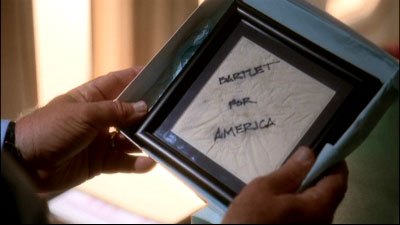
Rounding out the senior staff is Claudia Jean "C.J." Cregg (Allison Janney) in the role of White House Press Secretary. Having the least input of all regarding policy decisions, C.J.'s primary function is as a liaison between the White House and the press. Her duties range from the most mundane information dissemination about what the President had for breakfast or what the First Lady is wearing to dinner to critical damage control over major issues that can dramatically affect public perception. Although she has a master's degree in Political Science, C.J.'s background is mostly in public relations, her previous job developing ad campaigns for a major Hollywood studio that makes terrible movies. Politically she is sometimes in over her head and is frequently studying the minutia of various policy concepts in order to speak intelligently about them in her briefings. One of the more frustrating aspects of her job is that she may be shielded from certain information to avoid being placed in the position of lying to the press.
Along with Leo, these four individuals make up the President's inner circle. While he has other advisors, many of whom appear on the show as guest stars, it's these key members of the senior staff who play the most prominent roles in the major issues faced by this administration. Bartlet's final close advisor comes in the form of a decidedly junior member of his staff. Charles Young (Dulé Hill) is the President's "body man", the personal aide who spends nearly every moment of each day within shouting distance of his boss. With the exception of the First Lady, he is the first to see the President in the morning and the last one to leave each evening. His job is not to negotiate the press or develop policy or campaign for votes. Charlie's number one priority is to assist the President directly in whatever manner possible, and this manifests itself in a wide array of tasks, from managing the President's travel schedule to arranging daily meals to acting as a gatekeeper to the Oval Office. His discretion and loyalty are highly valued, and his integrity rivals that of Bartlet himself, placing him in a position as a confidant unique among the staff. When policies and agendas are in heated debate and the weight of the world is on his shoulders, the President can turn to Charlie for a therapeutic level of apolitical friendship.
In fact, the relationships between the members of the President's inner circle go beyond friendship and have become a family. Each of these individuals has dedicated a significant portion of his life to serving the public and has undergone great personal sacrifice to be a part of this administration. They work endless hours for unimpressive wages and have almost no social lives or chances of holding together a marriage, but each of them recognizes that this is the greatest thing they will ever do, and they have all willingly made the sacrifice to be a part of something greater than themselves. Together they share an uncommon bond, formed through mutual struggle and admiration, and it is this sense of family that is one of the driving forces behind The West Wing.
Another hallmark of the series is its romantic sense of idealism, its unfailing belief that people are inherently good and that our government is made up of noble individuals striving to make things better for everyone. To Sorkin's credit, while sometimes unrealistic, this idealism is never Pollyannaish or insulting. These characters still make mistakes and struggle to find the right solutions -- often realizing there is no "right solution" -- but at the end of the day, their primary motivation is for the greater public good. In a society where almost no one trusts his government, and politicians are a notch above ambulance chasers and telemarketers on the despised profession ladder, it is amazing just how much admiration and hope The West Wing is able to inspire.
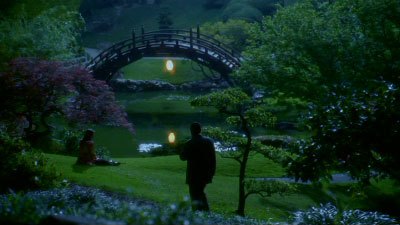
-- President Josiah Bartlet
The true brilliance of the show, however, is that none of this really matters. Democrat or Republican, it's less about the specific political agendas in play and more about the personal struggles these characters endure in an attempt to achieve their goals. If the audience believes that these issues are important to our characters, then the drama doesn't come from what side they're on but the process they go through to accomplish the task. The West Wing takes us through this day-to-day nuance of operations in the Executive Branch with an impressive level of clarity, and through the course of the show, we see just about every possible type of situation the White House might face, from getting a bill through congress to meeting with foreign leaders to authorizing military operations. In fact, there is so much going on in every episode that it is a wonder we are able to keep up with it all and find coherence in the insanity.
The West Wing achieves this success through a couple of key methods. First is the trademark "walk-and-talk" style that merges Sorkin's fast-paced witty dialogue with Schlamme's sweeping theatrical camera movements. This technique allows volumes of dialogue to be exchanged against a constantly changing backdrop that in itself is telling a story. The result is that the viewer is constantly engaged in the scene and is able to follow the complicated political maneuvering much more easily than if a bunch of characters were simply sitting around a table tossing about long speeches.
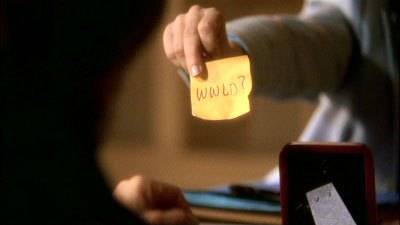
Another effective aspect of the series that rarely receives attention is the consistency of its supporting characters. The West Wing is a very intelligent and complicated show that is constantly balancing numerous facets of American government, so familiarity with the guest stars and understanding their respective roles is essential. Obviously, over the course of seven seasons, casting changes are unavoidable; but for the most part, there is a stability throughout the administration that places each event in its proper context. In the Situation Room, the President is often advised by Chairman of the Joint Chiefs of Staff Admiral Fitzwallace (John Amos), National Security Advisor Nancy McNally (Anna Deavere Smith), and Secretary of Defense Miles Hutchinson (Steve Ryan), each with differing philosophies on the need for military intervention. Politically, the administration can always turn to expert pollster Joey Lucas (Marlee Matlin) and campaign mastermind Bruno Gianelli (Ron Silver). When Bruno shows up to advise the Vinnick campaign in the seventh Season, it carries weight because we've gotten to know his talents so well. And in the Press Room, there's comfort seeing Danny Concannon (Timothy Busfield) in the crowd working for the public, knowing he's not going publish a needlessly sensational story but that he won't be pushed around by the Press Secretary either.
This character consistency even extends to the Secret Service with Ron Butterfield (Michael O'Neill) and Mike Casper (Clark Gregg), constant fixtures in the background for seven seasons. But perhaps the most effective aspect of this stability can be felt through the numerous assistants to the show's major characters. Leo's assistant Margaret (NiCole Robinson), C.J.'s assistant Carol (Melissa Fitzgerald), and Toby's assistants Bonnie (Devika Parikh) and Ginger (Kim Webster) are seemingly in every single episode, always doing something important to keep the production flowing and slowly growing themselves as memorable characters. And, of course, there's Donna Moss (Janel Moloney), the assistant to Josh Lyman whose character is so valued as to evolve into a starring role.
I take time to mention all of these people because they are so instrumental in creating a believable universe for the series. Most shows feature a central cast, and then depending on what is taking place in a particular episode, some guest stars and extras will be brought in to fill out the story. They may have a few recurring characters, but it is rarely anything near the scope achieved by The West Wing. The result is that we believe Vice President Hoynes (Tim Matheson) is a real character off giving speeches and preparing to run for President even when he's not on screen for months at a time. First Lady Abigail Bartlet (Stockard Channing) isn't just a go-to character stopping by every now and then but the President's partner in life with a presence felt throughout the show whether she's in an episode or not. These characters and their consistent use provide an incredible level of depth to the experience, making it feel like there truly is a massive government operating in the background of the series, and it adds weight and meaning to the daily decisions being made.
The consistency of having all these actors largely comes from wonderful casting and a clear dedication to the final product from both the producers and the stars themselves, but the nuance of their characters and how well it all flows together across episodes can by attributed to the steady involvement from creator Aaron Sorkin. Through his four seasons at the helm of The West Wing, Sorkin is either the sole writer or the man behind the teleplay in all but three episodes, an uncommon occurrence in television and a staggering achievement when you consider the dialogue saturation of each script and the theatrical nature of its presentation. The way he weaves these countless characters into deep political stories week after week in ways that both inform and entertain is at times awe inspiring, and during his years in charge of the show with Thomas Schlamme, it is difficult to point to anything better on the air at that time or ever.
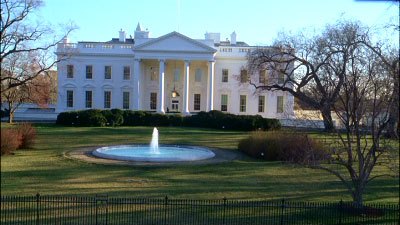
SEASON ONE: 
-- Toby Ziegler
The series begins about a year into Barlet's first term. While they have a pretty good handle on most of the administrative duties, many in the staff are still struggling to establish their roles. To the chagrin of the President, his administration is largely just spinning its wheels, so consumed with political compromise and the bureaucratic system that they are unable to accomplish any genuine forward progress. Keeping the government functioning and putting out fires is a good start, but each of them wants to do more than that. They recognize that this is probably going to be the most important thing they ever do with their lives, and they don't want to waste it.
Rewatching these first season episodes again some seven years after they originally aired, I was struck by how light and fun the early efforts are, most notably the pilot. There's an almost carefree nature to many of the early scripts, the music and performances giving the impression that this will be a fun little show about White House staffers. Issues still have weight, but not nearly as much as they'll have as the show progresses, and Sorkin's trademark wit seems to take center stage. Slowly, though, what starts as seemingly light entertainment evolves into something far greater, and a real power of storytelling begins to emerge. One wonders how much of an impact the casting of Martin Sheen ultimately had, likely changing more than just the involvement of the President himself but the entire tone of the series and just how important it could become.
Almost everything about this season is fantastic, as we slowly meet the varied individuals who become the heart and soul of the show. The only thing that does not work is the character of Mandy Hampton (Moira Kelly), a former media consultant when Bartlet was running for office who is brought in to shore up some of their public relations issues. Supposedly a real hard-nosed go-getter, she was once involved with Josh Lyman and is clearly intended to spar with him in a romantic capacity. Unfortunately, Kelly just isn't strong enough to hang with Whitfield's incredible performance as Josh, and Mandy comes across more annoying than likeable. To their credit, the producers figure this out pretty early on, and her involvement steadily decreases before fading away completely.
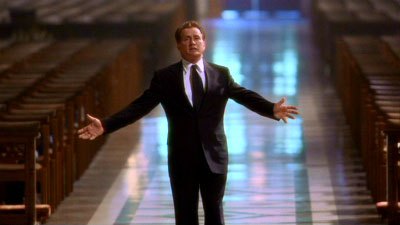
SEASON TWO: 
-- President Josiah Bartlet
For as strong as the first season is, the second season is even better, with nearly every episode working to perfection. The resolution to the previous cliffhanger is handled with grace and style as we journey to the past and learn about the early days of the Bartlet campaign and how this team of talented individuals came together. Plots being to broaden, covering even more areas of government and going into greater detail regarding the legislative process. The theme of "Let Bartlet Be Bartlet" from the end of the previous season takes shape as the administration progresses from simply keeping the government functioning to advancing it forward.
The role of the White House Counsel is woven into the stories and seen through the eyes of a wonderful new character Ainsley Hayes (Emily Procter). After cleaning Sam's proverbial clock during a televised debate program, the President takes notice and instructs Leo to hire her immediately, something that proves interesting considering she's a Republican. Far from a gimmick device, Ainsley serves to add balance to the series, reminding both the audience and some of the more intense members of the administration that Republicans are just as intelligent and well-meaning as Democrats. They simply believe in different solutions to complex problems. This addition to the cast is never pandering and frequently elevates an already great show, echoing the wisdom of Isaac Jaffe: "If you're dumb, surround yourself with smart people. If you're smart, surround yourself with smart people who disagree with you."
Along with Ainsley, we also meet her boss Lionel Tribbey (John Laroquette), a loud and intimidating ultraliberal whose unfortunate departure is softened by the addition of Oliver Platt as his successor Oliver Babish. While many of their interactions are in the background of the main plots, the White House Counsel becomes heavily involved when one of the season's driving plots begins to emerge: President Bartlet has relapsing-remitting multiple sclerosis, a condition that likely will not affect his presidency but was never disclosed to the public, making it at best a deception and at worst potentially a federal crime.
With a significant focus on the MS and how to address it with the public, the build-up to the season finale is very compelling, but it is magnified significantly by the events of the penultimate episode "18th and Potomac". Intense and beautiful, Sheen delivers some of the best work of his career in these closing episodes, and the season climaxes with such power and conviction that viewers can't help but wish this guy really were the President. In a nice treat for the fans, the "cliffhanger" isn't a "What will happen?" finale but an "Oh hell yeah, I can't wait for it to happen!" sendoff. When completed, the second season takes the series from one of the promising new shows on the schedule to one of the best television series of the past 20 years.
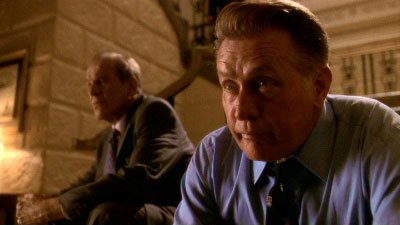
SEASON THREE: 
-- President Josiah Bartlet
Like many shows in the Fall of 2001, The West Wing's third season was delayed after the devastating attack to the World Trade Center on September 11th of that year. While each series returned to the air in its own way and in its own time, The West Wing looked on the tragedy as a chance to do something unique that might have some lasting value. The result was a filmed play entitled "Isaac and Ishmael", set within the show's universe but at no particular point in its timeline. Without directly referencing 9/11, the episode focuses on the fears of both children and adults regarding the increase in terrorism. Under heightened security, the White House is locked down while a group of overachieving high school students are touring the facilities. Many of the senior staff use this opportunity to open an educational dialogue between themselves and the students in a cathartic discussion of how and why the world is changing. A subplot between Leo and a man in the White House who shares the same name as a suspected terrorist is heavy-handed and a little insulting, but the primary story of the episode is effectively rendered, and the effort is admirable.
When the season itself gets underway, two primary issues are addressed: the President's bid for re-election in the wake of his MS announcement and the growing threat of terrorist attacks from the fictional Middle Eastern nation of Qumar. The campaign plot weaves even more new characters into the cast, including the brilliant political operative Bruno Gianelli and his aides Connie Tate (Connie Britton) and Doug Wegland (Evan Handler). It also allows the writers and actors to stretch their talents in another political direction for a while, and it works quite well. Instead of just running the country, we get to see how Bartlet sells himself to the American public and why they might actually decide to vote for him. His efforts to fend off Republican challenger Robert Ritchie (James Brolin) add yet another layer to an already rich story, but if there is one drawback to this plot, it's that Ritchie isn't a particularly strong character and is beneath the level of development many of the other Republicans have displayed on the show.
The other significant plot from this season is Bartlet's internal conflict over what to do about Abdul ibn Shareef (Al No'mani), the Qumari Defense Minister who is responsible for terrorist attacks against the United States. The man is clearly a terrorist and behind, among other things, a plot to destroy the Golden Gate Bridge, but Qumar is supposedly an ally and one of few friends in the Middle East. The decisions Bartlet has to make on this front are some of the most difficult of his presidency, and the scenario underscores just how serious this position can be.
One notable feature of Season Three is the addition of the outstanding Stockard Channing to the regular cast. Her presence on the show is so powerful, as she's really the only person able to match intellect with the President, and having her in more scenes is a blessing. Also featured in this season is Amy Gardner (Mary-Louise Parker), a sassy women's rights activist who serves as a romantic foil to Josh. Like Mrs. Bartlet, she challenges him intellectually, and the dynamic between these two great actors is a joy to observe.
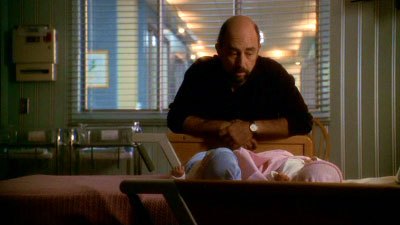
SEASON FOUR: 
-- Will Bailey
What would ultimately be the final season of the show with direct involvement from its creators, The West Wing finally started to slip in its fourth season, but only by the slightest of margins. It opens with a really fun two-parter revolving around Toby, Josh, and Donna getting stranded in small-town Indiana after a Bartlet campaign rally. Our heroes are so caught up in large-scale international struggles and political maneuvering that at times they forget the nation is filled with average people who don't care about all that stuff -- they're just trying to raise their kids and get by in a difficult world. These opening episodes are not only very funny but a nice reminder to the cast and viewers that Republican or Democrat, red state or blue state, most Americans are good, decent, hard-working people trying to make a living and provide something better to the next generation. Particularly endearing is a standout performance from soon-to-be-famous Amy Adams, and the story serves to re-inspire the White House threesome about just why they work so hard and what they're really trying to accomplish in their position.
Much of the fourth season follows the progress of the upcoming election between Bartlet and Ritchie, and it's handled fairly well. There's also a building subplot involving the Congressional race in Orange County, California, where a recently deceased candidate is still on the ballot, and his campaign manager Will Bailey (Joshua Malina) refuses to give up the fight to get him elected. Not only does this prove to be an interesting story on its own merits, but it becomes a very nice character transition allowing Sam Seaborn a creative way to leave the White House and Rob Lowe a chance to go star in The Lyon's Den.
For its strengths, many of the episodes lack the intense punch of previous seasons. Compared to other shows on the air at the time, it is still fantastic, but compared to the bar it had set for itself, it is lacking just a bit. All of that changes, however, as the season draws near its climactic finale. Likely sensing that this was going to be the end of his run, Sorkin crafts some of the most intense storytelling of his career, tapping into the indescribable love that comes with parenthood and beautifully weaving it into the primary story. Matthew Perry guest stars as another talented Republican member of the White House Counsel's office (Joe Quincy), and while chasing down a wild goose in a bit of hazing from C.J., he unexpectedly sets in motion a chain of events that will lead to one of the series' most memorable moments.
So many aspects of family and responsibility are examined in this stretch of episodes, as Toby prepares to become a father for the first time and Jed watches his youngest daughter Zoey (Elisabeth Moss) grow up and graduate from Georgetown. The way these two major life changes play against each other is so effective and a testament to what an incredible writer Sorkin can be. Martin Sheen does some of his best work as he struggles to cope with the events that transpire, but the true gem of this closing run is the performance of Richard Schiff. At the risk of appearing guilty of hyperbole, Schiff's work in the episodes "Commencement" and "Twenty Five" is not only the best of the show's seven-year run but some of the finest acting I've ever seen anywhere. It's staggering how well everything comes together at the end of this season, and it allows creators Aaron Sorkin and Thomas Schlamme to leave on the highest note possible.
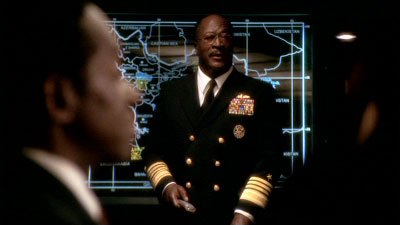
SEASON FIVE: 
-- President Josiah Bartlet
Frustrated with network meddling, the two top minds of the series had moved on, so show-runner responsibilities fell to experienced ER executive producer John Wells. While Sorkin had begun numerous story arcs to avoid leaving the cupboard bare when he departed from the show, the reality was that Wells was just not capable of continuing the nuance and depth viewers had come to expect, and The West Wing left the rarified air of the extraordinary to join the ranks of the decidedly ordinary.
First dropping the ball by hastily concluding the events of the amazing season finale from the previous year, the show gets bogged down in plots that just aren't that interesting. Characters start to lose their identities, becoming a little more petty and prone to doing something uncharacteristic just because it serves the plot. Also starting to fade is the heart and warmth and sense of hope that made the series so special. To the credit of the amazing talent in front of the camera, the season is not a complete loss as average scripts are still elevated to something interesting simply by watching these great performers inhabit their characters on screen.
The season concludes in the kind of overdramatic manner we would come to expect from the new writing staff. Disaster strikes when Donna goes on a fact-finding assignment to Gaza, and the American convoy is attacked, killing a favorite character and three Congressmen. It sets up a story arc that never fully takes hold with any real believability and feels closer to latter-years ER than the great series that led to this point. It also introduces us to what I'll call the "Wells Title Card", where the Executive Producer credit flashes on screen after wildly overdramatic drumbeats and silly editing effects conclude an episode.
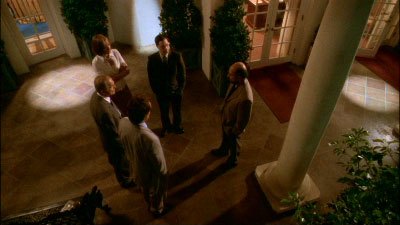
SEASON SIX: 
-- President Josiah Bartlet
Continuing the Gaza story established at the end of the previous season, the 6th year begins with President Bartlet defying the advice of his staff, not to mention the will of the people, in an attempt to solve the conflict between Israel and Palestine. His tilting at windmills in and of itself does not make for a bad story, but the way it is handled and the consequential decline in his relationship with Leo, is uncharacteristic and just not effective. The cheesy action music that seems ripped from a Bruckheimer film doesn't help either.
A funny thing happens, however, on the road to mediocrity. An almost tacit admission that the show we all fell in love with is something largely to be admired in the past tense, The West Wing begins to evolve into something new. Wells speeds up the timeline a bit, rushing to push Bartlet out of office, and it presents an opportunity to show the entire Presidential election process on both sides from start to finish.
Two television giants join the cast after the Gaza story concludes: Alan Alda as presumptive Republican nominee Senator Arnold Vinick and Jimmy Smits as one of many potential Democratic candidates Matthew Santos. Each is assisted by a strong woman in his life, Vinick's campaign manager Shiela Brooks (Patricia Richardson) and Santos's wife Helen (Teri Polo), and these additions to the cast could not be more perfect. To the credit of the new producers, the focus of the series slowly begins to shift from the past to the future, with many of the lead characters leaving their positions at the White House to dedicate themselves fully to electing the next leader of the country. Every aspect of the nomination process is examined in the latter stages of this season, and it all culminates into a surprisingly engrossing season finale at the Democratic National Convention where Hoynes, Santos, Bob Russell (Gary Cole), and Eric Baker (Ed O'Neill) all vie for a spot atop the ticket.
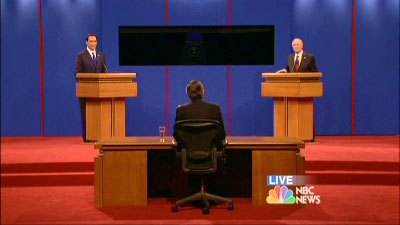
SEASON SEVEN: 
-- Josh Lyman
After budget cuts and a move to Sunday nights, the seventh season of The West Wing takes its cue from what worked the season before and becomes almost another show entirely. The key characters are still on the show, but they're pushed so far into the background as to be nearly insignificant. All the praise I heaped on this show earlier in the review about how the universe was so vast and realistic ceases to apply, as meetings and discussions in the White House become small in comparison, and plotlines within the White House become a distraction from the more interesting story being told elsewhere.
That said, the campaign show that emerged in Season Six becomes absolutely riveting and is the natural focal point of this final season. Santos and Vinick are impossibly great candidates, each dripping with integrity and style and class, and when you get past the unrealistic nature that men like this would run for President, it becomes so much fun to watch these giants exchange blows on the campaign trail and observe the details and nuance of the race to election night. Also, as a result of the shift in focus, the weight of the show slides from the shoulders of Martin Sheen and onto Bradley Whitford as Josh takes charge of the Santos campaign. Fortunately, Whitford is more than capable of carrying this burden, and the series thrives with him as the primary character.
One of the more creative events of the season comes with an episode simply titled "The Debate", where an actual live television debate is held between the two candidates. While some dismissed this as a gimmicky ratings ploy, it was executed with surprising quality, and much of that can be attributed to Lawrence O'Donnell's writing, structuring the episode in such a way that neither candidate looks better than the other. Who "won" the debate is determined less by the script and more by each viewer's personal opinions about government's role in society. These are both honorable and qualified men who simply disagree on the most effective way to run the country, and it is reminiscent of the idealism that was the hallmark of earlier seasons.
The final task of this season is also effectively executed, bringing closure to the show in a satisfying manner. Minor character problems still arise, and it's pretty difficult to buy some of the actions of C.J. and Toby, but the final episodes do succeed in capturing those moments of "What now?" from the staffers who are leaving the White House after spending every waking moment there for so many years. "Requiem" pays fitting tribute to the late John Spencer, and the final episodes do a strong job closing out the show while giving us a glimpse into the future of these characters and the country. While it lost its way for a while in the fifth and sixth seasons, The West Wing finds a way to finish strong.
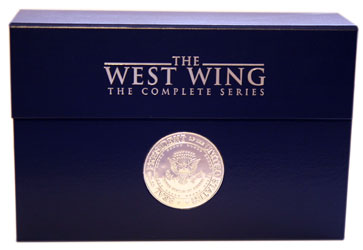

PRESENTATION:
This "Complete Series Collection" is presented in creative packaging befitting the style and class of the series. A very sturdy cardboard dossier case with a magnetic closing mechanism, a faux leather surface, and the seal of the President embossed on the front houses seven thin folders, each containing an entire season of the show. The folders slide in through the top of the case, distinguished by offset labeled tabs, just like a typical office file folder, with the exception that these are adorned with gorgeous black-and-white photos from the series. Double-sided discs from the first three releases have been replaced with preferable single-sided discs featuring attractive season-specific cover art. These first three seasons span seven discs each, with six discs a piece in each of the remaining four. Each disc slides into a thin slot on the corresponding panel, and at first it seems like this structure would damage the data side of the discs. However, after sitting through all 45 discs of this release, I can report that I did not experience a single problem with playback. One after another, the discs played perfectly, and one would think that if this packaging were an issue, I would have encountered it.
The menu structure on the DVDs is nicely organized, with effective animated menus set against W.G. Snuffy Walden's inspiring theme music. Episodes can be accessed through a "Play All" feature, by episode, or through a simple scene selection. Many of the special features also have a "Play All" selection, making it very easy to watch everything on the discs without a bunch of unnecessary clicking and waiting.
Audio is provided in Dolby Digital 2.0, and like most television shows of this nature, there isn't much that distinguishes it from everything else. It's perfectly adequate without any noticeable flaws. Dialogue is clear, the opening title sequence is full, and there is consistency across the episodes and the seasons. Some of the special features experience a slight spike in volume, and one of them has audio fidelity issues, but those are minor annoyances. Subtitles are included in English, Spanish, and French.
There is some variance to the video, as the show was not broadcast in widescreen during the first season. Consequently, first season episodes are presented in the appropriate 4:3 aspect ratio, while the rest of the seasons are in anamorphic widescreen. In the second season, "Previously On ..." segments (often referencing first season content) and the opening titles are pillar boxed to account for the difference. The video quality itself is largely strong, presenting the deep color tones and creatively lit scenes fairly well. The style of the series features a lot of dark scenes, and the black levels on this release sometimes fall short as characters have a tendency to get lost in the shadows. Also, often with four episodes per disc, there are some compression artifacts, but nothing too distracting. Exterior sequences, especially those filmed in Washington D.C. under what I'm sure were less than ideal lighting conditions, betray a significant amount of grain. On the whole, it's a very good video presentation and on par with similar releases, but it is far from perfect.
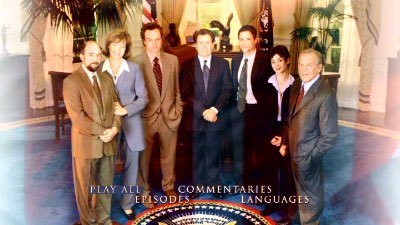 | 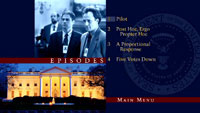  |
WHISTLES & BELLS:
In addition to the fancy packaging, there are two extra inclusions with this "Complete Series Collection". First is the script to the pilot accompanied by an introduction from writer Aaron Sorkin. I typically don't laugh out loud very much while reading, but this introduction is hilarious with all the wit and charm he breathed into the series itself. It essentially tells the story of how the show came to exist, and while most of the information is known already, I think fans will enjoy reading it in the words of the man himself. Disappointingly, there's a printing error in my copy, and Page 47 is duplicated in the slot for Page 15. Also included is a 70-page episode guide, which is normally not the kind of thing I would have much interest in, but this one is presented with such professional quality and with so many gorgeous photos of key events in the show and promotional material that I thoroughly enjoyed flipping through it and reliving the series at a glance.
SEASON ONE:
Season One contains the largest collection of special features in this set, all on Disc #7. There are four Featurettes: "The Primaries" (17:32) focuses on the show's inception and how they went about casting; "The Inauguration" (29:02) goes into depth on the set design, the structure of the dialogue, and how they shot the walk-and-talks; "Capital Beat" (8:09) covers the numerous consultants, their experience in actual politics, and the effort to capture the realism of the process; and "Sheet Music" (8:09) is all about Snuffy Walden's compositions for the series. Each of these is very enjoyable.
There are four Deleted Scenes (5:19), one each from the episodes "He Shall From Time to Time ...", "Take Out the Trash Day", "Six Meetings Before Lunch", and "What Kind of Day Has it Been". Probably the best of these is a great scene between Charlie and Zoey going through a typical lovers' spat. Gag Order (3:00) is a small blooper reel, and The West Wing Suite (1:53) is an extended variation of the main theme set against memorable scenes from the season. Finally, Off the Record (3:31) is a blooper reel of sorts taken from the footage used in the other documentaries.
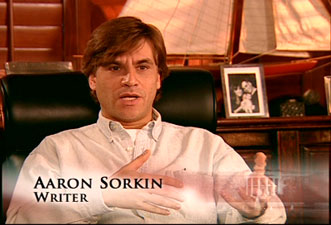
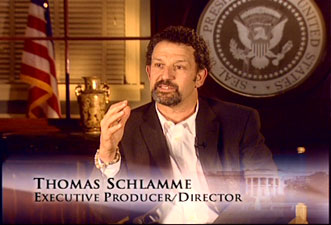
SEASON TWO:
On Disc #14 is another Featurette, "Constructing 'Two Cathedrals'" (17:42), that focuses on the production of the dramatic season finale. Another Gag Order (1:20) is included, but there isn't much to it. 10 Deleted Scenes (10:23) are available this time for the episodes "In the Shadow of Two Gunmen, Part I", "The Midterms", "Bartlet's Third State of the Union", "The Leadership Breakfast", "The War at Home", "Ellie", "Someone's Going to Emergency, Someone's Going to Jail", "18th and Potomac", and "Two Cathedrals". The standout scene here is a dialogue between Toby and C.J. about the merits of inviting Officer Jack Sloan (Richard Riehle) to the State of the Union address.
Also on this disc is an awkward feature called Access Granted. The idea here is to have an interactive overhead blueprint of the White House that you can navigate around with your DVD, but like most of these things, it is very poorly thought out and most annoying to click through. Buried within it is a wonderful tour (14:53) with Thomas Schlamme and production designer Jon Hutman. Someone probably spent a lot of time designing this thing, but it would have been better to just isolate the tour and include it with the other featurettes, because it's very interesting and would be disappointing to miss.
SEASON THREE:
Disc #21 continues the theme with two more Featurettes: "A Property Master's Story" (10:49) interviews Blanche Sindelar and Steve Whiteside, two key individuals in developing the unique props used on the show; and "The Chief of Stuff" (13:23) focuses on the incredibly exhausting duties of the President's personal aide, featuring interviews with real life aides for President Clinton, Andrew Friendly (1993-1994) and Kris Engskov (1997-2000). These are just the right length and well worth watching. More Deleted Scenes (5:07) are included for the episodes "The Two Bartlets", "Enemies Foreign and Domestic", and "Posse Comitatus". The last one is pretty heavy-handed, and I'm glad they cut it.
My favorite inclusion from this set is the excellent Documentary Special (42:06) that originally aired on NBC before the final four episodes of the third season. Put together by William Couturie and Al Gore speechwriter/show producer Eli Attie, this informative documentary takes the audience behind the scenes of the real characters on which those from the show are based. Presidents Ford, Carter, and Clinton, Secretary of State Henry Kissinger, and numerous Chiefs of Staff, Press Secretaries, Speechwriters, Personal Aides, and general staffers are on hand to discuss what it is really like to work in the White House. This could have easily been a pat-on-the-back clipfest, but it's actually a very interesting and informative documentary.
SEASON FOUR:
Starting with the fourth season, the special features are no longer on a separate disc. There also aren't nearly as many of them. For this season, there are two more Featurettes: "Behind Every Good Man is the First Lady" (12:35) that obviously covers the unique position of First Lady and "The Letter of the Word" (18:41) that is all about speechwriting. The first has some crackling in the audio and features some lower quality interview footage, but both are interesting. Deleted scenes are now called Outtakes (4:40), and there are three of them, one each from "Game On", "Arctic Radar", and "Holy Night".
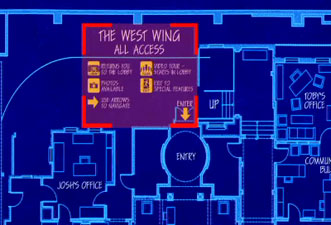
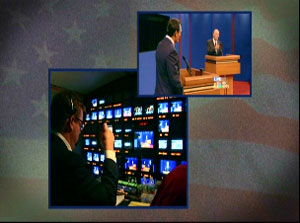
SEASON FIVE:
Two more Featurettes this time: "In POTUS We Trust" (13:45) is about President Bartlet and the parallels between him and Martin Sheen, and "Gaza: Anatomy of an Episode" (15:03) provides information on how they went about shooting an episode that was so different from the rest of the series up to that point. Deleted scenes are no longer outtakes but "Political Missteps", they're included along with the episode on the appropriate disc this time, and some are even accompanied by introductions! "Memorial Day" (3:21) features director Christopher Misiano talking about why a scene was cut, "Slow News Day" (4:13) is preceded by director Alex Graves and has a great little scene fleshing out the silver spoon intern Ryan Pierce (Jesse Bradford), and "Eppur Si Muove" (0:39) has a very brief moment where Debbie Fiderer (Lily Tomlin) mocks Leo for his fear of puppets.
SEASON SIX:
Just one Featurette here: "C.J. Cregg: From Press Secretary to Chief of Staff" (14:49). Like all the other ones, it's the right length and just entertaining enough to warrant taking the time to watch.
SEASON SEVEN:
Accompanying the debate episode on Disc #41 is a parallel behind-the-scenes look into the control room called "The Debate: Live From the Director's Chair" (50:40) that shows us exactly what director Alex Graves is doing during every moment of the live broadcast. On Disc #45 is an actual Featurette, "Countdown to West Wing Live" (25:18) that covers the genesis, preparation, and ultimate execution of the same episode. It's very interesting, but I was disappointed not to see anything about John Spencer or some kind of final farewell retrospective about the show.
AUDIO COMMENTARIES:
There are audio commentaries all over the place on this set, and the quality ranges from complete boredom to absolute fascination. In some episodes, Aaron Sorkin is handing out nifty tidbits of information like candy on Halloween, and in others he's interrupting his fellow speakers and endlessly rambling. Still, in others, no one says much of anything, because they're too busy watching the episode itself. This happens a lot when cast members are present. Sadly, there are no commentaries for the final season. If you have to pick and choose which ones to sample, I recommend the "Pilot" on Disc #1, "Twenty Five" on Disc #27, and "7A WF 83429" on Disc #28.
| 1.01 | Pilot | Aaron Sorkin and Thomas Schlamme |
| 1.10 | In Excelsis Deo | Aaron Sorkin, Thomas Schlamme, and Alex Graves |
| 1.14 | Take This Sabbath Day | Aaron Sorkin and Thomas Schlamme |
| 1.15 | Celestial Navigation | Aaron Sorkin, Thomas Schlamme, and Christopher Misiano |
| 1.22 | What Kind of Day Has it Been | Aaron Sorkin and Thomas Schlamme |
| 2.01 | In the Shadow of Two Gunmen, Part I | Aaron Sorkin, Thomas Schlamme, Bradley Whitford, and Janel Maloney |
| 2.02 | In the Shadow of Two Gunmen, Part II | Aaron Sorkin, Thomas Schlamme, and Martin Sheen |
| 2.10 | Noël | Aaron Sorkin, Thomas Schlamme, and Bradley Whitford |
| 2.21 | 18th and Potomac | Aaron Sorkin, Robert Berlinger, and Kathryn Joosten |
| 3.02 | Manchester, Part II | Aaron Sorkin, Thomas Schlamme, and Allison Janney |
| 3.09 | Bartlet for America | Aaron Sorkin, Thomas Schlamme, and John Spencer |
| 3.21 | Posse Comitatus | Aaron Sorkin, Thomas Schlamme, and Alex Graves |
| 4.05 | Game On | Aaron Sorkin, Thomas Schlamme, Alex Graves, and Joshua Malina |
| 4.21 | Commencement | Aaron Sorkin, Thomas Schlamme, and Alex Graves |
| 4.22 | Twenty Five | Aaron Sorkin, Thomas Schlamme, and Chistopher Misiano |
| 5.01 | 7A WF 83429 | John Wells and Alex Graves |
| 5.02 | The Dogs of War | John Wells and Christopher Misiano |
| 5.17 | The Supremes | Alex Graves, Jessica Yu, and Debora Cahn |
| 6.13 | King Corn | John Wells and Alex Graves |
| 6.20 | In God We Trust | Lawrence O'Donnell, Jr. and Christopher Misiano |
| 6.22 | 2162 Votes | John Wells and Alex Graves |
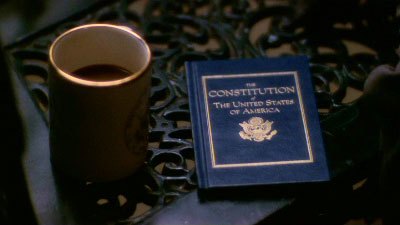
CONCLUDING THOUGHTS:
For the better part of four seasons, The West Wing was the best show on network television. It combined the wit and charm of Aaron Sorkin with a stellar cast and a production quality typically reserved for theatrical presentations. It made in-depth political analysis compelling for even the most casual viewer and inspired hope in those frustrated with what has happened to American government. Its romantic idealism showed us the best of humanity and reminded us of the greatness we can achieve when we reach for the stars. While the series lost its footing with Sorkin and Schlamme's departures, it reinvented itself during the sixth season and became something compelling once more. If you've avoided this series because you disagree with liberal views or you simply were unable to see it for other reasons, you missed something amazing, and this set provides a great opportunity to partake in one of the finest series ever produced for American television. This "Complete Series Collection" captures the show's stylish and classy nature, and I Highly Recommend it.
|
| Popular Reviews |
| Sponsored Links |
|
|
| Sponsored Links |
|
|
| Release List | Reviews | Shop | Newsletter | Forum | DVD Giveaways | Blu-Ray | Advertise |
|
Copyright 2024 DVDTalk.com All Rights Reserved. Legal Info, Privacy Policy, Terms of Use,
Manage Preferences,
Your Privacy Choices | |||||||











